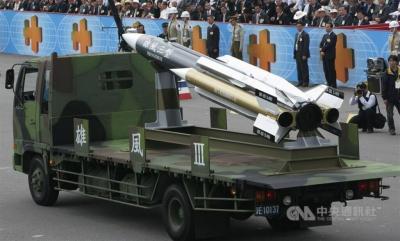US lawmakers’ passage of a bill that aims to ensure the country’s leadership in the Indo-Pacific region shows growing anti-China sentiment in the US Congress, a researcher said on Friday.
The US House Foreign Affairs Committee on Thursday passed the Ensuring American Global Leadership and Engagement Act (EAGLE Act), which contains several provisions regarding the US’ diplomatic and economic ties with Taiwan.
“There is this anti-China sentiment there, which is driving members of the US Congress to explore every type of option to strengthen ties with Taiwan,” said Arthur Ding (丁樹範), professor emeritus in National Chengchi University’s Graduate Institute of East Asia Studies.

Photo: Chien Jung-fong, Taipei Times
The act calls for an expansion of the US-Taiwan trade relationship, urges action to promote Taiwan’s participation in international organizations and calls for starting negotiations on renaming Taiwan’s representative office in the US to the “Taiwan Representative Office in the United States.”
The Taiwan International Solidarity Act — which was incorporated into the EAGLE Act — states that the UN’s recognition of the People’s Republic of China as the sole representative of China makes no determinations about Taiwan’s sovereignty or its representation at the UN.
“The renaming of Taiwan’s representative office in the US in particular must be addressed, because the current name — the Taipei Economic and Cultural Representative Office — does not sound political in nature,” Ding said. “The current name reduces Taiwan’s status to that of Hong Kong.”
Former minister of foreign affairs Chen Chien-jen (程建人) said the bill shows that US-China relations have hit a new low.
“However, this has also resulted in many Taiwan-friendly voices within the US Congress to emerge,” he said.
The US recognizes China’s rise as a challenge and threat to its interests, which provided the impetus for creating the EAGLE Act, he said, adding that any law aimed at China would unavoidably touch upon Taiwan.
“However, things like renaming the representative office are sensitive subjects, and it remains to be seen whether the US administration will act upon the clauses of this act,” he said.
Nevertheless, support for Taiwan at different levels of the US government and society is a welcome sight, he said.
The EAGLE Act needs to be reviewed by the full House before being put to a vote in both chambers of Congress and being signed into law by the US president.
Additional reporting by CNA

STATS: Taiwan’s average life expectancy of 80.77 years was lower than that of Japan, Singapore and South Korea, but higher than in China, Malaysia and Indonesia Taiwan’s average life expectancy last year increased to 80.77 years, but was still not back to its pre-COVID-19 pandemic peak of 81.32 years in 2020, the Ministry of the Interior said yesterday. The average life expectancy last year increased the 0.54 years from 2023, the ministry said in a statement. For men and women, the average life expectancy last year was 77.42 years and 84.30 years respectively, up 0.48 years and 0.56 years from the previous year. Taiwan’s average life expectancy peaked at 81.32 years in 2020, as the nation was relatively unaffected by the pandemic that year. The metric

Taiwan High Speed Rail Corp. (THSRC) plans to ease strained capacity during peak hours by introducing new fare rules restricting passengers traveling without reserved seats in 2026, company Chairman Shih Che (史哲) said Wednesday. THSRC needs to tackle its capacity issue because there have been several occasions where passengers holding tickets with reserved seats did not make it onto their train in stations packed with individuals traveling without a reserved seat, Shih told reporters in a joint interview in Taipei. Non-reserved seats allow travelers maximum flexibility, but it has led to issues relating to quality of service and safety concerns, especially during

A magnitude 5.1 earthquake struck Chiayi County at 4:37pm today, the Central Weather Administration (CWA) said. The hypocenter was 36.3km southeast of Chiayi County Hall at a depth of 10.4km, CWA data showed. There were no immediate reports of damage resulting from the quake. The intensity of the quake, which gauges the actual effect of a seismic event, measured 4 in Chiayi County, Tainan and Kaohsiung on Taiwan's seven-tier intensity scale, the data showed. The quake had an intensity of 3 in Chiayi City and Yunlin County, while it was measured as 2 in Pingtung, Taitung, Hualien, Changhua, Nantou and Penghu counties, the data

The Supreme Court today rejected an appeal filed by former Air Force officer Shih Chun-cheng (史濬程), convicted of Chinese Communist Party (CCP) espionage, finalizing his sentence at two years and two months for contravening the National Security Act (國家安全法). His other ruling, a ten-month sentence for an additional contravention, was meanwhile overturned and sent to the Taichung branch of the High Court for retrial, the Supreme Court said today. Prosecutors have been notified as Shih is considered a flight risk. Shih was recruited by Chinese Communist Party (CCP) intelligence officials after his retirement in 2008 and appointed as a supervisor